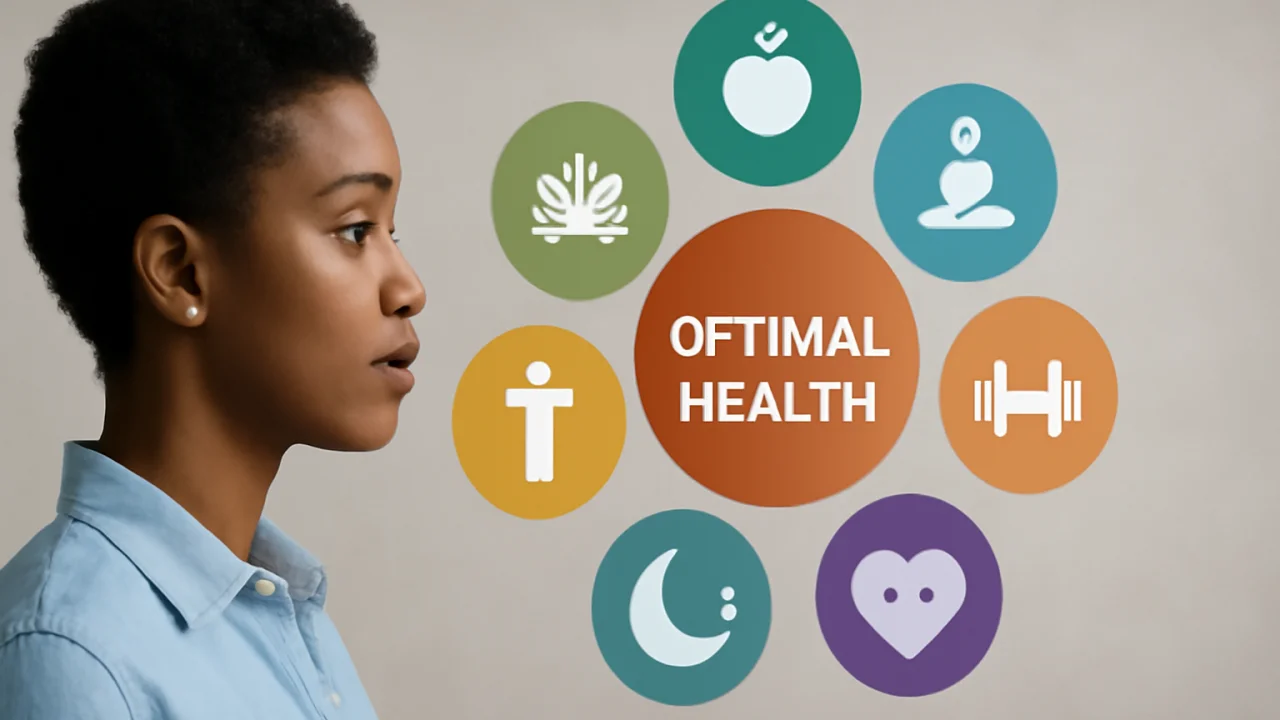
Ultimate Guide to Achieving and Maintaining Optimal Health in 2024
📑 Contents
Ultimate Guide to Achieving and Maintaining Optimal Health in 2024
Optimal health is more than just the absence of disease—it's a holistic state of physical, mental, and social well-being. With ever-evolving research and new lifestyle challenges, understanding how to achieve and maintain peak health is crucial. This guide explores the latest, science-backed strategies for nutrition, exercise, mental health, disease prevention, and more to help you thrive in 2024 and beyond.
Understanding Optimal Health: A Holistic Perspective

Optimal health encompasses several dimensions: physical, mental, emotional, and social well-being. It's not just about avoiding illness; it's about thriving in all aspects of life. The World Health Organization (WHO) defines health as a “state of complete physical, mental, and social well-being and not merely the absence of disease or infirmity.” Achieving balance across these dimensions is key to living a fulfilling and productive life.
Why Holistic Health Matters
Focusing on holistic health helps reduce the risk of chronic diseases, improves quality of life, and enhances longevity. It also supports better coping mechanisms for stress and life changes, promoting resilience and satisfaction.
Nutrition: Building Blocks of Health

Proper nutrition fuels your body, supports immune function, and helps prevent chronic diseases. In 2024, dietary guidelines continue to emphasize whole foods, plant-based options, and moderation.
Key Principles of Healthy Eating
- Variety: Incorporate a wide range of fruits, vegetables, whole grains, lean proteins, and healthy fats.
- Balance: Distribute macronutrients (carbohydrates, proteins, fats) appropriately for your age, activity level, and health status.
- Moderation: Limit added sugars, sodium, and processed foods.
- Hydration: Aim for at least 8 cups (2 liters) of water daily, more if you’re active.
Popular Diet Trends in 2024
Plant-based diets, intermittent fasting, and Mediterranean-style eating continue to gain popularity for their health benefits. However, personalization is key—consider your individual needs, preferences, and any medical conditions when choosing a dietary approach.
| Diet | Main Features | Potential Benefits | Considerations |
|---|---|---|---|
| Mediterranean | Fruits, veggies, whole grains, olive oil, fish | Heart health, anti-inflammatory | Requires fresh ingredients |
| Plant-Based | Mostly plants, limited animal products | Lower disease risk, weight control | Watch for B12, iron deficiencies |
| Intermittent Fasting | Time-restricted eating windows | Weight loss, improved metabolism | May not suit everyone, especially those with certain medical conditions |
Physical Activity: Move for Life

Regular exercise is vital for cardiovascular health, weight management, bone density, and mental well-being. In 2024, the focus is on sustainable movement—finding activities you enjoy and can maintain long-term.
Recommended Physical Activity Guidelines
- Adults: At least 150–300 minutes of moderate-intensity aerobic activity per week, plus muscle-strengthening activities 2 days a week.
- Children/Teens: At least 60 minutes of physical activity daily.
Types of Exercise
- Aerobic: Walking, cycling, swimming
- Strength: Resistance training, bodyweight exercises
- Flexibility: Yoga, stretching
- Balance: Tai chi, balance drills
Mixing these types of exercise not only improves physical health but also reduces the risk of injury and supports overall well-being.
Mental Health: The Foundation of Well-Being
Mental health is equally as important as physical health. Stress, anxiety, and depression rates have risen globally, making proactive mental health care essential.
Strategies for Supporting Mental Health
- Mindfulness: Practice meditation, deep breathing, or yoga.
- Social Connection: Maintain relationships with friends and family.
- Seek Help: Don’t hesitate to contact mental health professionals if needed.
- Healthy Lifestyle: Regular exercise, balanced nutrition, and sufficient sleep all support brain health.
Digital mental health resources—such as teletherapy and mindfulness apps—are more accessible than ever, making support easier to find.
Disease Prevention: Proactive Steps for Longevity
Preventing illness is always preferable to treating it. Modern medicine and lifestyle interventions can dramatically reduce the risk of many chronic diseases.
Top Preventive Health Measures
- Regular Screenings: Blood pressure, cholesterol, cancer screenings, and more as recommended for your age and risk factors.
- Vaccinations: Stay up to date on all recommended immunizations.
- Healthy Weight: Achieve and maintain a weight within your healthy range.
- Avoid Harmful Habits: Don’t smoke, limit alcohol, and avoid recreational drugs.
Sleep: The Overlooked Pillar of Health
Quality sleep is crucial for immune function, cognitive performance, mood regulation, and physical recovery. Adults should aim for 7–9 hours per night.
Tips for Better Sleep
- Maintain a regular sleep schedule—even on weekends.
- Limit screen time before bed.
- Create a relaxing bedtime routine.
- Keep your bedroom dark, quiet, and cool.
Emerging Trends and Technologies in Health
Technology is transforming the way we approach health. Wearable devices, telemedicine, and personalized nutrition are making it easier to track and improve well-being.
Key Innovations for 2024
- Wearables: Track activity, heart rate, sleep, and even blood oxygen levels.
- Telehealth: Access healthcare professionals remotely for convenience and safety.
- Genetic Testing: Tailor diet and fitness plans based on your DNA.
Embracing these innovations can provide personalized insights, early warnings about health risks, and motivate healthier behaviors.
Frequently Asked Questions (FAQs)
1. What is the most important factor for achieving optimal health?
There is no single factor—optimal health is achieved by balancing nutrition, exercise, mental well-being, preventive care, and healthy sleep habits.
2. How can I start living a healthier lifestyle?
Begin with small, sustainable changes such as adding more fruits and vegetables to your diet, taking daily walks, improving sleep routines, and managing stress. Consistency is key.
3. Are supplements necessary for good health?
Most people can meet their nutritional needs through a balanced diet. However, certain individuals (e.g., pregnant women, older adults, vegans) may require supplements like vitamin D, B12, or iron. Consult a healthcare professional for personalized advice.
4. How often should I get health screenings?
Screening frequency depends on your age, sex, family history, and risk factors. Generally, adults should have annual checkups, with specific tests (e.g., cholesterol, cancer) as recommended by their doctor.
5. What role does technology play in health management?
Technology makes it easier to monitor health, access care, and receive personalized recommendations. Wearables, telehealth, and health apps can support healthy habits and early detection of health issues.
Summary
Achieving and maintaining optimal health in 2024 requires a comprehensive, proactive approach that balances nutrition, regular exercise, mental well-being, preventive care, and quality sleep. By adopting science-backed strategies and leveraging modern technology, you can reduce disease risk, improve quality of life, and enjoy long-term well-being. Start with small changes today and build sustainable habits for a healthier tomorrow.











